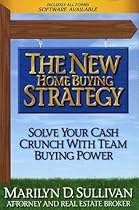The symbiotic relationship spawned by equity sharing requires a nurturing housing market and a well-orchestrated contract if it is to evolve into an American Dream.
by Broderick Perkins
© 2008 DeadlineNews.Com
Deadline Newsroom - Consider equity sharing a symbiotic relationship -- as well as a legal agreement -- between two or more people holding title to one home.
Las Vegas-based Creative Real Estate Online publisher, J. P. Vaughan, also a trial lawyer and real estate investor says, properly designed, the creative financing strategy can be a triple-win proposition.
An equity sharing deal is typically struck help sell a home, often in a tough market, but a tough market isn't a prerequisite. It also helps enable a home purchase when it might not otherwise be possible. And it is used to provide an investment with a financial return.
• Typically savings-poor, but income-rich, one person becomes the occupying homeowner with no or little money down.
• A second participant, the investor, provides the initial leverage usually in the form of a down payment stake. With time, he or she can enjoy a joint venture-like return on his or her money.
• The seller, in a slow market, can choose to become the investor or otherwise use the creative financing strategy to quickly seal a deal.
Deals vary, but in its simplest form, an equity sharing agreement works something like this:
• The buyer-occupant generally lives in the residence, pays the mortgage and other costs associated with owning and operating a home -- including taxes, insurance, maintenance and the like. He or she gets to deduct a portion of the mortgage interest, property taxes and others.
• The non-resident, often an investor, perhaps a family member, trusted friend or professional investor, provides all or part of the down payment, and in return gets tax deductions for her or his share of the mortgage interest and property taxes.
• Title to the home can be held in a variety of ways -- joint tenancy with right of survivorship, tenancy in common, partnership or as a living trust.
Equity sharing deals should be legal and binding contracts designed to provide an equitable means to an end. It should also include provisions for any disputes or disagreements that might arise during its term.
Contracts generally indicate that the parties cannot extract any returns until the deal is over. Escape clauses can come with stipulations providing for cash penalties for early outs or other resolutions.
At the end of some specified period, five, seven, ten years or so, the net proceeds from the sale are split between the buyer and investor, again, based on contractual provisions.
Generally and theoretically, through appreciation, an equity deal is set so that the occupant eventually earns a share sufficient to allow him or her to buy a home without help and to give the supporting investor a shot at a profit. Other resolutions can be contracted.
The creative financing tool isn't perfect for every market. While tight money markets can make equity sharing a viable financial avenue to homeownership, a market with flat or reverse home prices requires a deftly drawn contract with a term long enough to allow the deal to gel.
As is the case with any major financial transaction, assistance from a professional experienced in equity sharing agreements is paramount. In addition to the transactional contractual considerations, tax implications abound.
Entering an equity sharing deal with a verbal agreement and or non-binding contract is like searching for fools gold without a pickax.
Referrals from trusted resources -- real estate agents, tax professionals, accountants, other finance experts, and the like, are good resources to tap. Most professionals have a network of peers involved in various aspects of real estate.
The Internet's vast reach can also help make it easy to find qualified help. Keep in mind, the Internet is no better than the Yellow Pages if you don't thoroughly check out professionals' credentials, experience and track record for success.
A few resources include:
• Marilyn D. Sullivan's Home Equity Share network.
• J. P. Vaughan's Creative Real Estate Online.
• The Don Reedy, Peter Haglund, Howard Schwartz and Richard Borkowski BuyHalfAHouse.com team.
• The DirtLawyer.com team at Hoge Fenton Jones & Appel, Inc.
• Andy Sirkin's Sirkin Paul Associates.
© 2008 DeadlineNews.Com
Broderick Perkins, an award-winning consumer journalist of 30 years, is publisher and executive editor of San Jose, CA-based DeadlineNews.Com, a real estate news and consulting service, and the new Deadline Newsroom, DeadlineNews.Com's new backshop. In both cases, it's where all the news really hits home.
DeadlineNews.Com's Editorial Content Is Intellectual Property • Unauthorized Use Is A Federal Crime
Tuesday, February 26, 2008
Ins, Outs Of Equity Sharing
From The
Deadline Newsroom
on
2/26/2008 05:42:00 PM
![]()
Labels: Broderick Perkins, creative financing, Deadline Newsroom, DeadlineNews.Com, equity sharing, general contractors, investor, seller financing, taxes
Subscribe to:
Post Comments (Atom)


No comments:
Post a Comment